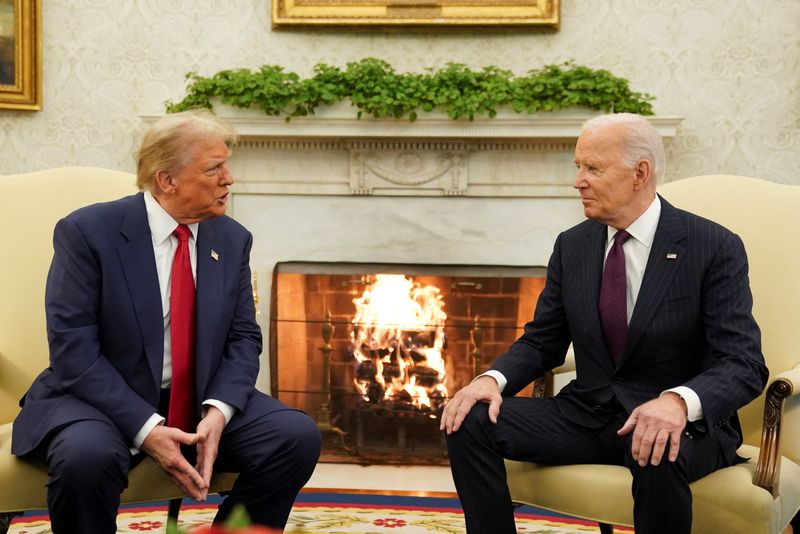(Reuters) - President-elect Donald Trump has vowed to repeal Joe Biden's signature climate bill called the Inflation Reduction Act, which initially aimed at some $400 billion in new spending and tax cuts and credits at accelerating America's transition to a green energy economy.
The Congressional Budget Office expects the cost to swell above $800 billion due to higher-than-expected demand for the tax credits; much of the direct funding has already been spent.
Rescinding or revamping the bill, which was passed in August of 2022 without a single Republican vote, would likely require an act of Congress. Industry groups including utilities and some elected Republicans in Congress are pushing for clean energy credits and other provisions to be preserved, while the pharmaceutical industry is asking for tweaks.
Trump advisers, meanwhile, have made a series of recommendations already that the Trump administration is expected to consider. Here's how industries and consumers could be impacted.
ELECTRIC VEHICLES: UNDER THREAT
The IRA provided $14.2 billion in incentives for purchasing emissions-free vehicles, such as electric vehicles, with income limits, and for installing alternative fueling equipment. It also created $2.9 billion in loans and grants for hybrid, electric and hydrogen cars.
Trump advisers are recommending redirecting money now flowing to building charging stations and making EVs affordable into national-defense priorities.
Trump plans to kill the $7,500 consumer tax credit for electric vehicle purchase.
The IRA also established $2.9 billion in loans and grants for the production of hybrid, electric and hydrogen fueled cars.
The IRA provided $3 billion for zero-emission U.S. postal mail trucks. The Trump team is considering canceling contracts to electrify the fleet.
CLEAN FUEL AND EMISSIONS STANDARDS: UNCLEAR
The IRA allocated $13.2 billion to promote clean hydrogen production and created $8.6 billion in new credits for low-carbon car and airplane fuels, and extended credits for biodiesel and other renewable fuels.
Aviation officials fear the rollback of green jet fuel credits and the Biden administration has yet to finalize the rules for the credits and may not before Trump takes office on Jan. 20.
WIND, SOLAR, NUCLEAR: UNCLEAR
The IRA created $62.7 billion in new tax credits for emissions-free electricity sources and storage, including wind, solar, geothermal and advanced nuclear and extended $51.1 billion in existing tax credits for wind and solar power
It also created $30 billion in tax credits to help existing nuclear reactors from closing.
While Trump has expressed scepticism about wind and solar power, so far this part of the IRA has not been targeted with any specific recommendations. Jobs and economic benefits have been heavy in Republican-voting states, making serious changes unlikely.
ENERGY INFRASTRUCTURE: UNCLEAR
The IRA included billions aimed at updating the U.S.'s overloaded power grid and getting new forms of energy online.
It spent $6.8 billion to update and expand lending programs aimed at boosting efficiency in energy generation and transmission, created $3.2 billion in tax credits for carbon capture and storage and provided $2.3 billion in loans and grants to finance electricity transmission, including for offshore wind energy generation.
MANUFACTURING
The IRA creates $37 million in new incentives for companies to manufacture clean energy technologies in the U.S. rather than abroad, through tax credits and the Defense Production Act. The U.S. Treasury has included related industries
It also spent $5.3 billion to help reduce emissions from energy-intensive industries, such as concrete production.
POOR, RURAL COMMUNITIES: UNCLEAR
The IRA creates a $20 billion "Green Bank" for energy investments, with a focus on poor and disadvantaged communities and spends $14.8 billion monitoring and reducing pollution, and in grants for disadvantaged neighborhoods.
It also includes $13.2 billion for investments in clean energy technology in rural areas.
ENERGY-EFFICIENT BUILDINGS: UNCLEAR
The IRA establishes $9 billion in rebates and grants for residential buildings and extends and increases $37 billion in tax credits for energy-efficient properties.
AGRICULTURAL FUNDING: UNDER THREAT
The bill provides $16.7 billion in new funding for agricultural practices that improve soil carbon, reduce nitrogen losses and decrease emissions.
House Republicans have proposed rescinding $14.4 billion of this funding in a draft farm bill that would make the money available to a broader range of agriculture conservation practices.
CLIMATE RESILIENCE: UNCLEAR

The bill provides $4.8 billion to help reduce risk of wildfires, $4.6 billion to combat droughts and $4.6 billion in investments in coastal areas and weather forecasting resources
It also spends $4.2 billion in federal research and funding for FEMA, DOE and Homeland Security.